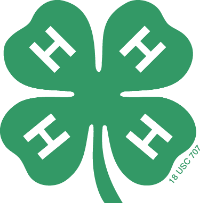Cooking
This book is for young people who are just learning to cook and bake. The project covers kitchen and food safety, basic food preparation and nutrition. It includes MyPlate, microwave cooking, meal time and measuring basics. There are recipes for snacks, side dishes, main dishes, quick breads and desserts.
PROJECT REQUIREMENTS
It may take you up to two years to complete the level. There are 40 different recipes to choose from and several learning activities to complete. Prepare two to three dishes from each recipe section: snacks, side dishes, breads and desserts (10-15 dishes total). Complete two learning activities: Explore MyPlate Activity, Demonstrate your knowledge of safety basics, Experiment: Test for Safety of Microwave Dishes, Experiment: How much Flour will a Measuring Cup Hold? and/or Demonstrate your knowledge of Cooking Basics: Give a demonstration to a leader or at your club. Complete at least one community service activity.
MATERIALS
M 4-H Cooking 101, 01512Y
Each level builds upon skills learned in 4-H Cooking 101. At the beginning of each section, background information is provided to help learn more about the science behind food preparation, the nutritional contribution of each food group and basic information about preparing foods. Recipes included for each food group. For example, as part of exploring the Milk Group, youth learn how to make white sauce. This skill is also used in the Meat and Beans Group to make Chicken Rice Casserole; in the Vegetable Group, several recipes use white sauce as a base.
PROJECT REQUIREMENTS
It may take you two or three years to complete the level. There are 40 different recipes to choose from and several learning activities to complete. Prepare two to three dishes from each recipe section: Fruits, Vegetables, Grains, Meat and Beans, Milk, and Desserts (10 to 15 dishes total). Give two to three informal demonstrations on food or kitchen safety to your helper, leader or club. Demonstrate knowledge on Cooking “How To” Basics. Complete at least one community service project such as baking food for a fund-raising bake sale.
MATERIALS
M 4-H Cooking 201, 01513Y
The 4-H Cooking 301 project builds on the skills young people learned in 4-H Cooking 101 and 201. At the beginning of each section, background information is provided to help youth learn more about the science behind food preparation, the nutritional contribution of each food group and basic information about preparing foods in the food groups.
Recipes are included for each food group. This curricula includes outdoor cooking, party planning, slow cookers, yeast breads and much more!
PROJECT REQUIREMENTS
Prepare two to three dishes from each recipe section: Fruit Group, Vegetable Group, Grain Group, Meat and Beans Group, Milk Group and Desserts (10 to 15 dishes total), Demonstrate your knowledge on cooking or baking techniques by giving a “How To” demonstration to your helper, leader, or club. Suggested topic areas include yeast breads, short cakes, grilled foods and party planning. Complete one or two food science experiments. Complete at least one community service project such as planning and hosting a holiday party for the elderly or baking cupcakes for a homeless shelter.
MATERIALS
M Cooking 301, 01514Y
This project book is organized into sections by MyPlate Food Groups. Each section provides background information to help the young person learn more about the science behind food preparation. This is especially important in understanding how to produce quality products and to troubleshoot what went wrong when mistakes happen. Recipes are included for each food group.
PROJECT REQUIREMENTS
Prepare 2-3 dishes from each of the recipe sections: Fruit Group and Vegetable Group, Grains Group, Protein Foods Group, Dairy Group and Desserts. Demonstrate your knowledge on cooking or baking techniques. Give 3-5 “how to” demonstrations to your project leader, helper or club. Suggested topics include flatbreads, pastry, candy, celebration meal planning or meat preparation. Complete 1-2 food science experiments. Complete at least one community service project.

